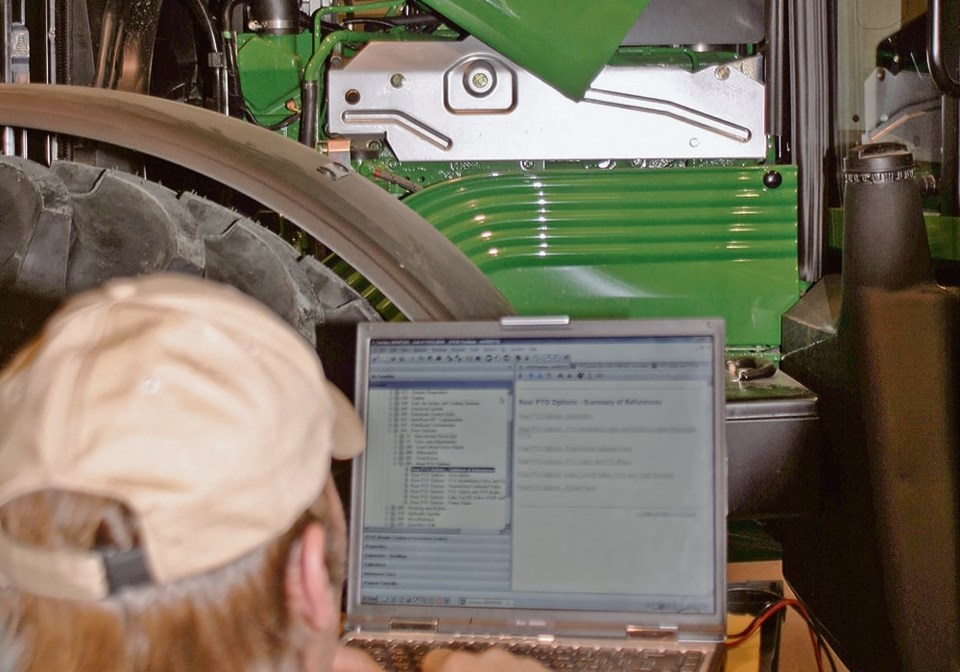WESTERN PRODUCER — Scan the website of any agricultural equipment, heavy truck or automotive dealership and you’re likely to find a posting on nearly every one looking to hire a service technician. There just aren’t enough of them go around these days. And ag dealerships are among the hardest hit by that shortage.
“Without question, this is one of the largest challenges our industry is facing,” said John Schmeiser, chief operating officer and president of the North American Equipment Dealers Association.
“We survey our dealers once a year about what’s keeping them awake at night when it comes to workforce development, and the shortage of technicians is there.
“In that same survey, based on our dealers’ existing capacity without building a larger shop, every dealer would take three to five mechanics right now if they could find them. When you multiply that by 400 locations in Western Canada alone, it’s a shortage of what we need right now of 1,000 perhaps 1,500. That’s dealing with today’s needs, not taking into consideration what the future needs would be as well as attrition rates of older folks retiring or moving on to other industries.”
During a recent Ag Equipment Intelligence Executive Briefing webinar, a group of American and Canadian dealers was assembled to discuss the industry from their perspectives, and the scarcity of qualified technicians figured prominently in their discussion.
“The technician is the most important part of our dealership and the most sought-after guy or gal we need,” said Todd Bachman, president and chief executive officer of Florida Coast Equipment. While his business is a long way from the Canadian Prairies, his concerns were shared by the others.
“Here’s what’s crazy about that,” he said. “Overall, in the industry, we tell a technician you’ve got to show up with 50 grand of tools and we’ll start paying you to work here. Yet we’ll take a salesman, buy him a 50,000 or 70,000 truck, give him a laptop computer and send him off. So, I think one of the things we’re going to have to do is really evaluate how we’re paying and treating our technicians. That’s got to change.”
But it’s only one aspect of the reason for the shortage.
“We’ve faced a number of events over the last decade or 20 years that have led us to this point,” said Schmeiser.
“Part of that was the attrition rate of our mechanics was about eight percent year after year. We kind of lost our pool of where we were getting our mechanics. Typically, our ag mechanics came from farm families. A generation ago farm families were larger, perhaps the oldest son took over the farm while others looked at a career in ag mechanics. That was a good pool for us. That pool is now getting smaller and smaller.
“At the same time, we’ve seen an incredible transformation of the sophistication of the equipment. So a higher skill set is needed to service modern equipment. Also, the equipment is getting to the point where it’s beyond our older technicians’ skill set.”
“The days of hiring a mechanic to turn wrenches are probably going to change to hiring mechanics that know how to code, program and fix this technology so it works 24-7,” said Todd Stucke, president of Kubota Tractor Co., during that Ag Equipment Intelligence webinar.
There are a number of initiatives underway to address the shortage, including some led by manufacturers. John Deere is sponsoring a program that is run at Olds College, Assiniboine Community College in Brandon and Sask. Polytech in Saskatoon. It provides the equipment and dealers are encouraged to find people to participate in it. Agco has established a partnership with the college in Lethbridge. New Holland has worked with Lakeland College. And there are others.
Manufacturers are contributing resources, because they recognize the problem affects them as well and their ability to sell to farmers.
“When we talk about labour shortages, we’re really finding we have to step in as OEMs in relationships with community colleges to help develop tech programs that are going to kick out more technicians for our dealers,” said Brad Arnold, vice-president of Massey Ferguson, North America. “We’re going to need them to partner with us over the next five years to find people that help install and support the technology.”
“There’s also a lot of difficulty in finding service managers,” added Schmeiser, “because today’s service manager requires a different skill set. There’s a customer relations aspect in addition to having a little bit of technical knowledge.”
Aside from looking for young Canadians to take up technician training, NAEDA has organized trade missions to Germany, Ukraine and Ireland to find mechanics willing to immigrate and work for equipment dealers. Currently, the organization is working on another initiative to bring technicians over from 小蓝视频 Africa.
“In addition to that, we also established a high school program in Saskatchewan that has expanded to a couple of other jurisdictions on a limited basis, where we have a high school ag mechanic program,” said Schmeiser. “Students get both high school credit and credit in an apprenticeship program for Grades 11 and 12.”
But it still comes down to enticing the right people to join the trade.
“We’re seeing our dealers speak to sons and daughters of our customers, encouraging them to consider this as a trade,” Schmeiser continued. “And our dealers have even stepped up to pay for a lot of their training, tuition and accommodation on the condition that when they’re done school, they come back.
“We realize doing one thing is not going to solve it. We need to do a bunch of things. It’s no longer grease monkey work; it’s sophisticated work with incredible pieces of machinery.”




